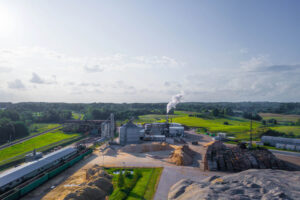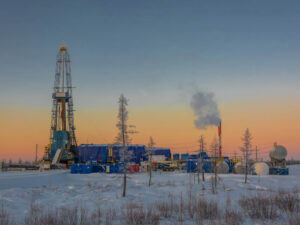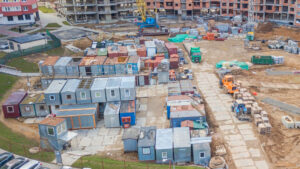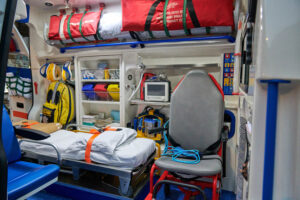
Explore Remote Camp Maintenance Jobs in Canada
Remote camp maintenance jobs in Canada support the full lifecycle of temporary worksites—from setup (mobilization) to daily operations (maintenance) and

There’s a growing need for adopting sustainable transportation solutions in remote camp operations through innovative strategies to help reduce CO2 emissions from fuel combustion. Rapid advances in technology innovation in the mining, construction and oil and gas sectors make it possible to provide an efficient transportation network that is safe, and accessible for all, while significantly reducing the environmental footprint.
The necessity of transportation in remote operations underscores the need for responsible mobility solutions. Minimizing the environmental impact of transportation is crucial not only for ecological well-being but also for the long-term sustainability of remote communities. An effective approach involves reimagining mobility options that are efficient, eco-friendly, and aligned with our commitment to reducing carbon emissions.
Transitioning to alternative fuels is a key component of our sustainable transportation strategy. By reducing reliance on fossil fuels and embracing cleaner alternatives such as biofuels, natural gas, and electric vehicles, we take strides towards curbing emissions. This transition not only reduces the carbon footprint but also encourages the development of a more sustainable energy ecosystem in remote areas.
Efficiency lies at the heart of sustainable transportation. A key approach employs advanced route optimization technologies to minimize travel distances and reduce fuel consumption. Strategically planning transportation routes, not only saves time and resources but also contributes to lower greenhouse gas emissions. Every efficient journey is a step towards a greener future.
Sustainable transportation extends beyond the vehicles themselves. It involves investing in the infrastructure that supports eco-friendly mobility. From charging stations for electric vehicles to maintenance facilities for alternative fuel vehicles, we are committed to creating an ecosystem that fosters sustainability in every aspect of transportation.
Sustainable transportation isn’t just about reducing carbon emissions; it’s also about engaging with local communities. Collaborating with Indigenous communities and local stakeholders to design transportation solutions that are culturally sensitive, economically viable, and environmentally responsible is key to success. By involving communities in decision-making processes, we create transportation solutions that benefit everyone.
The road to sustainable transportation in remote operations is a path of innovation, responsibility, and collaboration. A commitment to reducing the carbon footprint through sustainable transportation solutions exemplifies a passionate dedication to both ecological stewardship and community well-being. Embracing alternative fuels, optimizing routes, investing in green infrastructure, and engaging with local communities, can pave the way for a future where transportation is not just a means of connecting remote areas but also a vehicle for environmental conservation and progress.
Domco Group of Canada Limited is one of the most trusted and well respected remote sites service providers in Canada. Fully Canadian and independently owned, Domco has been in operation since 1945. We offer integrated remote site solutions, including a nutritious and well planned menu cycle, long-term relationship building, and deep Canadian roots in remote locations with Aboriginal communities.
Let us take you through some key advantages that set us apart.

Remote camp maintenance jobs in Canada support the full lifecycle of temporary worksites—from setup (mobilization) to daily operations (maintenance) and

Remote catering companies play a vital role in supporting Canada’s vast and varied industries, especially those operating in isolated or

Oil and gas facilities management is a complex and critical discipline that ensures energy operations in Canada’s most remote locations

In the rugged, often isolated world of remote construction camps, construction facility management is the invisible force that sustains daily

Remote maintenance is the backbone of operational continuity in Canadian work camps, especially those located in isolated regions supporting industries

Remote camp health and safety is a vital concern in the management of Canadian remote workforce camps, especially in resource-driven

Keeping crews energized and satisfied starts with smart camp food menu ideas—especially in remote environments where morale and nutrition go

Gas remote camp mobilization is a critical operational phase in Canada’s oil and gas industry, particularly in remote and northern

When it comes to remote site security in Canadian work camps, ensuring safety and protection is paramount. These facilities, often

In Canada’s vast and resource-rich landscapes, remote site maintenance plays a pivotal role in sustaining the operations of work camps

In Canada’s vast and often isolated regions, remote camp management plays a vital role in advancing sustainability across diverse work

Remote site administration is a vital function in Canada’s most geographically isolated and operationally demanding environments. From the Arctic’s frozen

Developing a sustainable infrastructure for a remote camp facility located in the rugged, often isolated regions of Canada—such as the

In Canada’s vast and rugged landscapes, remote facility catering has evolved from a logistical challenge into a platform for sustainable

Budgeting for facility repair and maintenance in remote Canadian work sites is no small task. When miles away from urban
